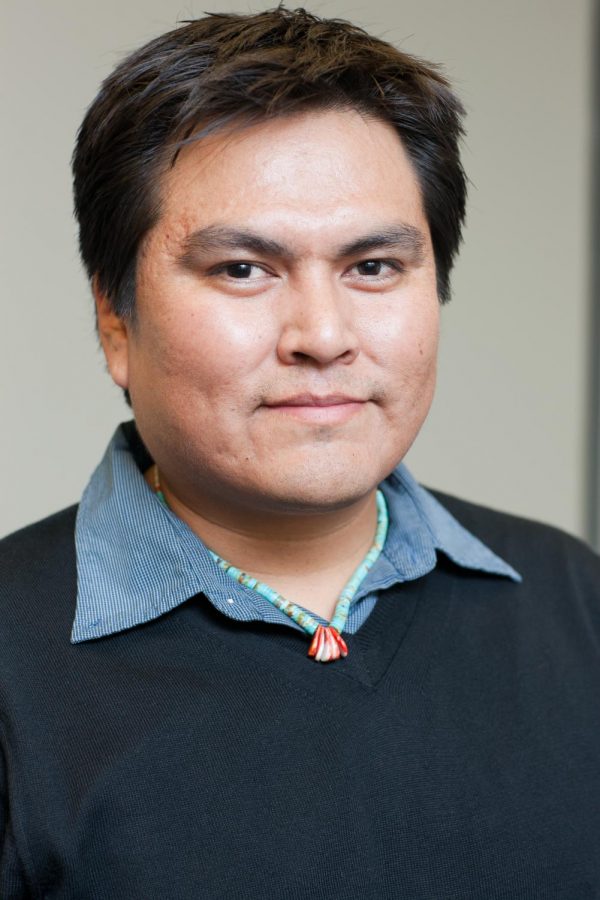Annual Writing Awards ceremony to have second virtual event
Sherwin Bitsui is the 2021 guest poet.
April 6, 2021
At a university that sees the majority of students pursuing degrees in the health sciences, business and engineering, it can be easy for a writing contest and awards ceremony to be overlooked. However, that is not the case with Gannon University’s Writing Awards program, which draws submissions from students in a variety of disciplines.
In a year that has been unusual and different from the rest, that variety remained the same in this year’s writing contests, the results of which will be announced at Gannon’s 44th Annual Writing Awards ceremony on April 16.
Categories that students submitted entries to include research, journalism and poetry. In addition, a national high school poetry contest garners submissions from across the U.S., and a new category introduced last year, the Berwyn Moore Erie Young Poets Award, recognizes two Erie-based poets with the special award, which honors Berwyn Moore, a retired Gannon English professor and Erie’s first poet laureate.
The guest poet featured at this year’s awards will be Sherwin Bitsui, the first Native American poet featured in the history of the event. As in past years, an afternoon workshop with the poet will be available for students and faculty to participate in.
“The awards night has traditionally celebrated diversity in creativity,” Shreelina Ghosh, Ph.D., an assistant professor in the English department, said.
Since 1988, Gannon has hosted a guest poet at each Writing Awards ceremony. This, Ghosh said, allows for further community engagement and interest.
“Our ability to invite reputed poets has had an immense crowd-pulling potential,” she said. “It attracts audiences from local high schools, neighboring cities and Gannon faculty and students. Erie’s rich poetic community looks forward to the event every year.”
In addition to attracting a sizable crowd, the writing contests attract submissions across all genres, from high school students to Gannon students, depending on the nature of the contest.
According to Douglas King, Ph.D., an associate professor in the English department, the National High School Poetry Contest garners nearly 1,000 submissions each year from schools across the country. Winners of this contest, as well as those in the Gannon poetry contest, open to graduate and undergraduate students, receive a monetary prize.
Winning poetry, as well as other poetry that is submitted, is published in Totem, Gannon’s award-winning literary arts magazine. Although COVID-19 impacted the release date of the publication, Anna Brink, a junior English major and editor of the magazine, said that Gannon is booming with talent.
“For Totem, we have received beautiful, creative works from the Gannon family,” Brink said. “We have such a talented faculty, staff and students here at Gannon.”
Students can also submit entries to the journalism contest, which includes such categories as news writing, feature writing and op-eds. Each winner in the journalism category receives a monetary prize, like those in the poetry category.
The research writing contest is coordinated by King and consists of three categories: freshman, undergraduate and graduate. Papers are judged by faculty members from various departments and are given scores, which determine the place of the paper – first, second, third or honorable mention.
According to King, the research submitted by students goes beyond the stereotypical definition of the discipline.
“When people hear ‘research,’ some think only of the sciences, but of course every field of study involves and can feature research writing,” he said. “Every year we receive a great variety of submissions from students across a myriad of majors.”
In the other contests, judges consist of community members and people who work within the discipline of the work being judged. In the journalism category, pieces are judged by Liz Allen, a former Erie Times-News editor and current city councilwoman and Eric Compton, a former copy editor.
“The community involvement is extremely encouraging for us,” Ghosh said.
Unfortunately, due to the ongoing COVID-19 pandemic, both the afternoon workshop and awards ceremony itself will be held on Zoom and streamed on Gannon’s social media platforms. Small but integral parts of the night will be missed out on because of this.
“As a result, we will miss our opportunity to provide hospitality to the poet and the wonderful formal reception in the evening where the poet gets to meet our university administration and contest winners,” Ghosh said.
In addition, King said that winners will not be able to be handed their awards as they are recognized at the ceremony. Instead, they will have to either pick up their awards or have them mailed.
“Still, the awards night will go on, live but virtual, including all of its components,” he said.
Despite the differences and missed opportunities of the virtual event, Ghosh feels there are benefits to it that the strictly in-person event didn’t allow for in the past.
“The online format does make it possible for participants from across the country to watch the event live or recorded,” she said. “Instead of the 200-something audience in the Yehl Ballroom, we can potentially have more audience.
“We would like to continue streaming the event online in 2022 alongside an in-person event in Yehl Ballroom to get the best of both worlds, as they say.”
MADELINE BRUCE





